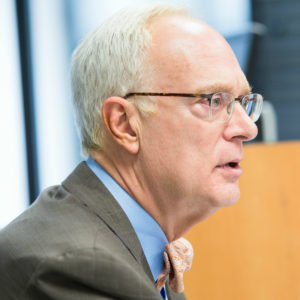Ideas & Public Policy
Examine the influence of ideas in some of our key policy debates.
July 18–July 22, 2022
Washington, D.C.
In this seminar, fellows will consider the intersection of theory and practice in our national politics, and particularly in our key economic debates. Led by National Affairs editor and policy expert Yuval Levin, this seminar will survey major domestic challenges confronting our country, giving fellows a better understanding of just what policymakers do, of how economics and politics interact, and of how to approach some of our most contentious national debates.
Yuval Levin and Robert Doar on the future of the think tank
This course was part of our residential Political Studies Program. Fellows participate in morning seminars and meet prominent men and women in public life over afternoon and evening sessions.

Yuval Levin is a Resident Scholar and Director of Social, Cultural, and Constitutional Studies at the American Enterprise Institute and the Editor of National Affairs magazine. Mr. Levin served on the White House domestic policy staff under President George W. Bush.

Yuval Levin is a Resident Scholar and Director of Social, Cultural, and Constitutional Studies at the American Enterprise Institute (AEI) and the founding Editor of National Affairs magazine. Prior to joining AEI, he was Vice President of the Ethics and Public Policy Center and EPPC’s Hertog Fellow.
He is a Contributing Editor of National Review and The Weekly Standard and a Senior Editor of EPPC’s journal The New Atlantis. Author and editor of numerous books, including The Great Debate: Edmund Burke, Thomas Paine, and the Birth of Right and Left (2013), The Fractured Republic: Renewing America’s Social Contract in the Age of Individualism (2016), and he most recently published A Time to Build: From Family and Community to Congress and the Campus, How Recommitting to Our Institutions Can Revive the American Dream (2020). His essays and articles have appeared in numerous publications including The New York Times, The Washington Post, The Wall Street Journal, Commentary, and others.
Before joining EPPC, Mr. Levin served on the White House domestic policy staff under President George W. Bush. He has also been Executive Director of the President’s Council on Bioethics and a congressional staffer. He holds a B.A. from American University and a Ph.D. from the University of Chicago. He is a recipient of a 2013 Bradley Prize for intellectual achievement.
Readings:
Discussion Questions:
Readings:
Discussion Questions:
Readings:
Discussion Questions:
Readings:
Discussion Questions:
Readings:
Discussion Questions:

Daniel DiSalvo
Daniel DiSalvo is a Senior Fellow at the Manhattan Institute’s Center for State and Local Leadership and an Assistant Professor of Political Science at The City College of New York-CUNY. His scholarship focuses on American political parties, elections, labor unions, state government, and public policy.

Christopher DeMuth
Christopher DeMuth is a Distinguished Fellow at the Hudson Institute in Washington, D.C. He was President of the American Enterprise Institute for Public Policy Research from 1986–2008 and D.C. Searle Senior Fellow at AEI from 2008–2011.

Yuval Levin
Yuval Levin is a Resident Scholar and Director of Social, Cultural, and Constitutional Studies at the American Enterprise Institute and the Editor of National Affairs magazine. Mr. Levin served on the White House domestic policy staff under President George W. Bush.

Adam J. White
Adam J. White is the Laurence H. Silberman Chair in Constitutional Governance and senior fellow at the American Enterprise Institute, where he focuses on the Supreme Court and the administrative state. Concurrently, he codirects the Antonin Scalia Law School’s C. Boyden Gray Center for the Study of the Administrative State.